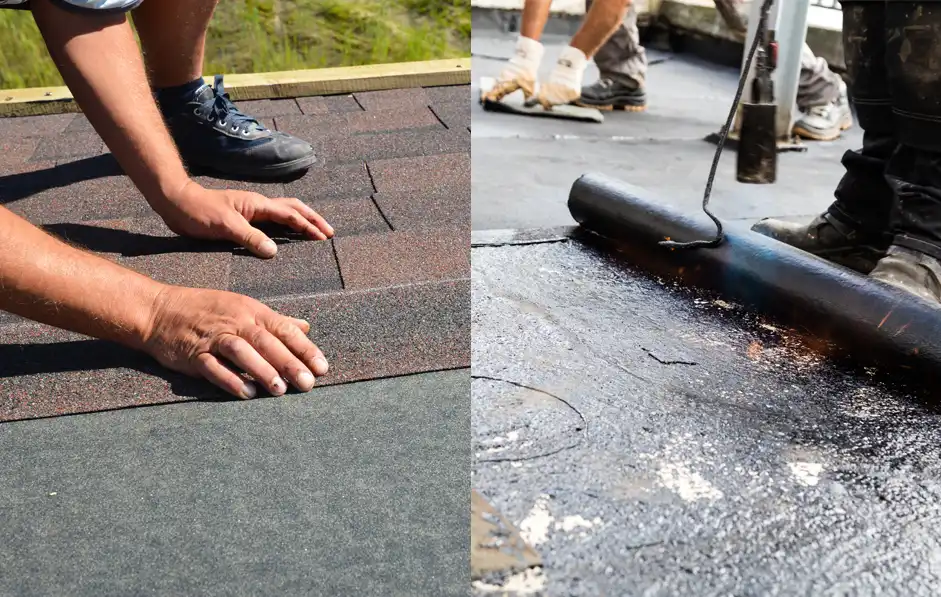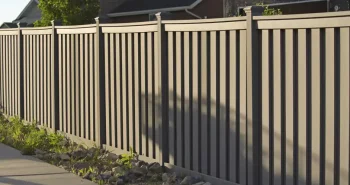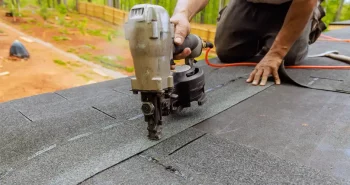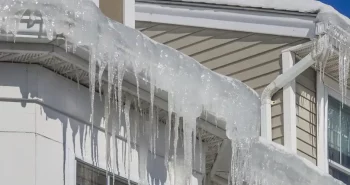Roofing plays a vital role in protecting our homes and businesses from the elements, but is there really a difference between commercial roofing vs. residential roofing? Simply put… yes, and whether you’re a homeowner or a business owner, understanding these differences is essential to making informed decisions about your roofing needs. Residential and commercial properties require unique maintenance and care in order to boost longevity, keep the structure safe, and uphold various weather conditions. That’s why we’ve compiled a comprehensive guide that explores the distinctions between residential and commercial roofs and includes various aspects such as materials, design, maintenance, installation, repair, and overall cost.
What is Commercial Roofing?
Commercial roofing is the type of roofing system that’s installed on any non-residential structure or building. This includes things like office buildings, warehouses, factories, hospitals, shopping malls, and more. Oftentimes, this involves installing a flat roof, but there are instances where a slight slope can be used. Commercial roofs are designed to provide protection for a wide range of commercial activities and typically cover a substantially larger surface area than their counterparts.
What is Residential Roofing?
Residential roofing, on the other hand, is specifically designed for homes and other livable structures or residential properties. These roofs primarily serve to shield the occupants from the elements and provide insulation for interior living spaces. However, they can also be designed to boost the aesthetics of a residential building, so they’re available in a range of styles, designs, and materials.
6 Differences Between a Commercial and Residential Roof
Although both have the same underlying purpose, there are some major differences between commercial vs. residential roofs. So, if you’re wondering what’s the difference, consider the following factors.
1. Type of Roofing Materials
One of the most significant differences between residential and commercial roofing is the type of materials used. Due to the nature of the property, commercial building owners need durable materials that can withstand more weight and help maximize the building’s efficiency. So, commercial roofs tend to utilize more industrial materials. Common materials for commercial roofing include:
- Built-up roofing (BUR): Multiple layers of tar and gravel or asphalt applied between ply sheets.
- Modified bitumen roofing: Asphalt-based material with added modifiers.
- Metal roofing: Steel, aluminum, or copper sheets.
- TPO (Thermoplastic Olefin) roofing: Single-ply roofing membrane made of synthetic materials.
- EPDM (Ethylene Propylene Diene Monomer) roofing: Rubber roofing membrane.
Residential roofs still need to be durable, but the materials don’t need to be as industrial. Some of the most common residential roofing materials used include:
- Asphalt shingles: Many typical residential homes use asphalt shingles. This is the most popular choice for residential roofing due to its affordability and versatility.
- Wood shingles or shakes: Offer a rustic and natural appearance.
- Clay or concrete tiles: Provide durability and a distinct aesthetic.
- Metal roofing: Increasingly used in residential applications due to longevity and energy efficiency.
- Slate roofing: Known for its elegance and long lifespan.
The choice of roofing material for commercial or residential use depends on factors such as the building’s purpose, location, budget, and desired aesthetics. A professional roofer can help you determine the best option for your needs.
2. Roof Design
The design of commercial and residential roofs also varies significantly due to their distinct purposes. A commercial roof is typically a flat or low-slope roof designed to accommodate large HVAC units, vents, and other equipment commonly found on commercial buildings. They often have a parapet wall for added protection. This is quite different from residential properties that are primarily constructed for aesthetics. As such, residential roofs can be designed however a homeowner prefers. They come in various styles, including gable, hip, mansard, and shed roofs. The design is more focused on aesthetics and curb appeal rather than functionality. Residential roofs tend to have a steeper pitch to allow for effective water runoff, but it is possible to have a flat roof on a residential property.
3. Roofing Maintenance
Maintenance requirements differ between commercial and residential roofs due to their size and complexity. A commercial building’s roof needs more regular maintenance due to its larger surface area and the various equipment and systems that are installed across the surface. To help ensure longevity and reduce the risk of extensive repairs, professional inspections and routine maintenance should be done at least twice a year. Residential roofs are generally smaller and simpler, requiring less frequent maintenance. Generally speaking, one professional inspection per year should suffice. However, homeowners should still conduct periodic inspections to address minor issues before they escalate. Similarly, if you think your roof has been damaged during a storm, contact an experienced roofing contractor.
4. Installation Requirements
Understanding the differences between commercial and residential roofing is essential when planning for roofing installation. Commercial and residential roofs also differ in terms of installation requirements. Both require a professional roofing contractor, but the time and complexity can be vastly different. Commercial roofing installation is typically more complex and time-consuming. It often involves a team of experienced contractors familiar with commercial-grade materials and the specific needs of commercial buildings. Residential roofing installation is more straightforward and quicker. A smaller crew can often complete it but should still involve local roofing contractors and residential roofing specialists. Residential building owners should never try to install their own roof, as it requires skilled roofing experience and understanding to avoid issues.
5. Roofing Repair
Roof repairs for commercial and residential roofs vary based on their materials, design, and purpose. Commercial roof issues are often more extensive and may require specialized equipment due to commercial roofing systems’ larger size and complexity. Additionally, the presence of HVAC units and other equipment on commercial roofs can complicate repair work. Residential roof repairs tend to be more straightforward and can often be completed by experienced roofing contractors. However, the availability of materials and the extent of repairs needed will influence the time and cost of the repair work.
6. Overall Cost
Finally, the overall cost of commercial and residential roofing projects can vary significantly due to the factors mentioned above. Commercial roofing projects tend to be more expensive than residential projects due to the larger size, specialized materials, and complexity of the installation. Costs can vary widely depending on the type of commercial roofing system chosen and the specific requirements of the building. Residential roofing projects are generally more cost-effective compared to commercial projects. However, the choice of roofing material, the home’s size, and the design’s complexity will impact the overall cost. Asphalt shingles are often the most budget-friendly option for residential roofing.
Working with Experienced Commercial and Residential Roofers
Commercial roofs differ from residential roofing, so they need to be handled in their own unique ways. Commercial roofs are designed for larger industrial structures and require more robust materials, complex designs, and maintenance. In contrast, residential roofs focus on aesthetics, curb appeal, and simpler maintenance requirements. Understanding the difference between commercial roofing vs. residential roofing is essential when planning a new project. Whether you’re a business owner looking to protect your commercial property or a homeowner seeking to safeguard your family and assets, choosing the right roofing system is crucial for your structure’s long-term durability and functionality.
Ultimately, both commercial and residential roofs play vital roles in protecting the spaces we live and work in, and making informed choices about their construction and maintenance is essential for the safety and comfort of occupants. That’s why finding a reliable commercial roofer or a team of residential roofers is so important. Luckily, if you’re looking for a skilled and reputable roofing contractor to help with your roofing needs, First Star Exteriors is here. As one of the region’s leading roofing companies, our team will help you avoid bad roofing jobs and leave you with a beautiful roofing installation that lasts for years. Our skilled contractors understand how to determine what materials will work best for your structure and how to properly install them to maximize performance, aesthetics, and longevity.
When you’re ready to get started on your new roof selection and installation, contact First Star Exteriors. We believe there’s a perfect balance between hands-on, personable treatment, quality of work, and speed of delivery. The roofing contractors at First Star Exteriors always take the time to understand your needs and communicate effectively from the first quote to the last nail placed. To learn more about our commercial and residential roofing options or to get a quote from us today within 48 hours, contact us at (479) 267-4800 or fill out our contact form here.





